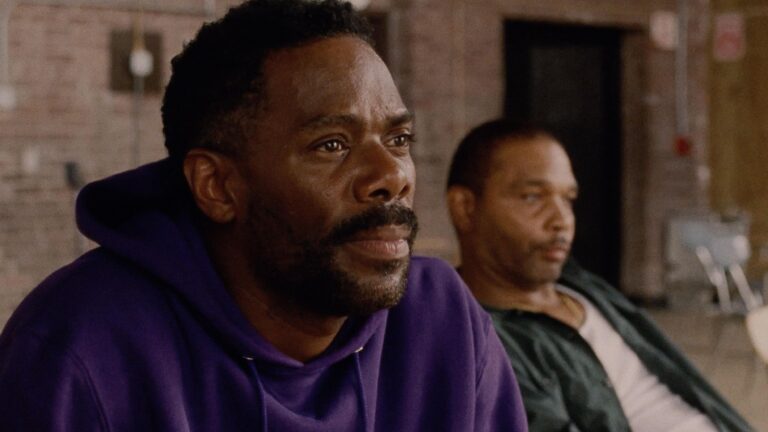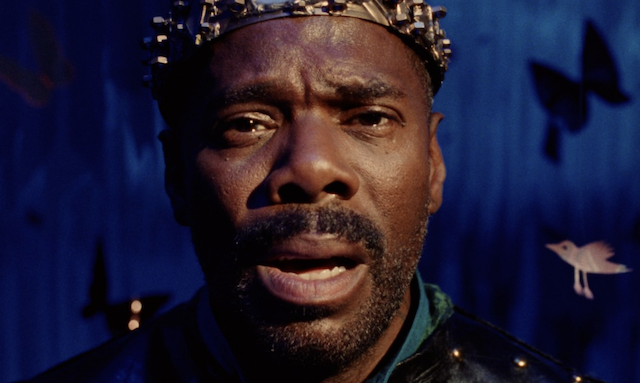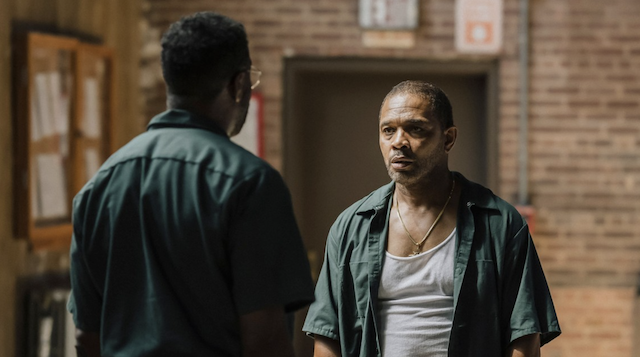
©Courtesy of A24

©Courtesy of A24
Q: I want to start from the very end of Sing Sing. What was it like for you to play that last scene? And what did it take out of you? What did you receive at that moment?
Clarence Maclin: I was so happy to be able to be there. Unfortunately, I couldn’t do it when the real Divine Whitfield was released, but I would’ve loved to be there. That’s what I bought into the scene, what I wanted for my brother. I don’t know how it happened, I just wasn’t there. It has been indicative of a lot of brothers. I knew that walking up the hill with forty dollars in your pocket and nobody waiting for you. It’s a terrible feeling. Terrible feeling. It’s like walking from out of one prison into a bigger one. So I wanted to be there for him, it was great that at least I could do that in the movie.
Q: This movie shows a different side about men incarcerated. Not only black men. How did you work to explore this version of your character?
Colman Domingo: This was established already when I read the Esquire Magazine article. I thought RTA was such a fascinating program, using art to transform the inmates’ lives. Divine Whitfield took full responsibility to do it, to do the work, even in a system that is not set up for this. So I wanted to give the character my best version, whatever I could to be a part of it. During the early Zoom meetings, we talked about what was important to us. I knew what was very important to me: I wanted to see more tenderness between black and brown men. I think that’s radical.
We need more of that. It can be something liberating for us. I came in with that heart because it was already established. I saw that they were doing that. We could see each other, we wanted to be there for each other. I wanted to create this movie together. Sing Sing is about so many things, but I think ultimately it’s about our humanity. It’s about the possibility that someone can pour, love and hope on you. This is our liberation for our mental health. There are so many men struggling because someone said they can’t be what they are supposed to be. I wanted to bring all of that into this film. This is the way we created it on set every single day. And this is the way we release it. So I can say it’s a tremendous responsibility.
Q: You were actually part of RTA. When you were a kid, did you take any acting classes?
Clarence Maclin: When I was younger, I liked to draw. However, that wasn’t the cool thing to do when I was growing up. I was supposed to be a football or a basketball player, or something like that. When I informed people that I’d rather draw something, they looked down at me. I never really touched a draw again. I was so caught up in the peer pressure of society. I didn’t get a chance to express myself. Then I got into RTA: I was supposed to be going to the yard to do something else but there was rain and thunderstorms so we met up in the gymnasium where RTA was preparing a play.
I thought that everybody that came to do the play was from outside, I didn’t know too much about the program at that time. Then while I’m watching I realize I know this guy for the yard. I see him in the gym. I decided I might need to be a part of this. At the time you had to not have any infractions or tickets, anything at least for one year to get admitted to RTA. And I was bad, I was terrible. I always had infractions, always had.
I had to change my behavior just to get accepted into the program. So for the whole year, I was walking a straight line. That’s how bad I wanted it. I wanted to be in such a commitment. It starts with you taking responsibility. It reconnected me to something that was missing. I think I stayed out of trouble. And then when I got in somebody dropped out. They asked me to step up. I couldn’t wait. I didn’t have any lines. The director said I was doing well, so one day he gave me two lines. I felt so proud of myself.
Q: You shot Sing Sing in eighteen days, between The Color Purple and Rustin. How did all of those roles inform each other?
Colman Domingo: I like to say that I hope to be used to telling stories about all the different brothers and different spirits. While I was doing The Color Purple I knew what I was experiencing and looking at, what the weight of the world has done to this man. And then going to Rustin, somebody who had liberated himself, but still was fighting systems. Between I was offered the gift of being part of this company and creating this everyman. Somebody who’s more delicate.
I just wanted to explore his faith and his hope. When I met John he told me that he was basically a jailhouse lawyer, he was in there advocating for his fellow inmates. He actually believed that the system could work, the man who was in there because the system didn’t work for him, but he still had hope. He clung to programs like being a founding member of RTA. When he told me he wanted to be a dancer, he lit up. That’s when I understood I could do it. I had to lean into this process and trust my brothers. And let that be part of the process of doing this work because it’s just as important as a civil rights leader or an Alice Walker novel.

@Courtesy of A24
Q: What have you taken from it? What did it stay with you?
Colman Domingo: I think the idea of his actions. When the system is telling you that you’re something else, or It’s not your turn. And you still dig deep, find that thing that gives you hope. Something you believe. I was raised with the thought that the world is a place doing more good than harm. Sometimes I’m challenged as well. John believed what he would tell his brothers would help them with their liberation. When he was going home one of his brothers told him: “Let me send you something, somebody somewhere”. John said: “ No. You pass it on and you do something for somebody else. Forward.” If that isn’t somebody who has faith and love, I don’t know what it is…
Q: What do you want the audience to take away watching Sing Sing? What do you want them to activate?
Clarence Maclin: I would like them to take away that people in prison are just people. They’re not animals. They didn’t stop being human beings because they got convicted. Still human beings, people with their lives. Their parents will pass away their children’ still growing. You could look around yourselves, look around your community. Your circles. And I’m positive that you’re going to find somebody who needs a bit of luck. Somebody who needs a bit of hope. Somebody who needs somebody to say: “Listen, I got you. It’s not over.” See who you can pour a little love into and change their direction. Change the way they think, change the way they see themselves. Cause that’s where it stops. When we see ourselves.
Q: How has the experience of making Sing Sing changed your posture? Has it changed your mindset?
Clarence Maclin: First thing it caused me to interact with a lot of beautiful people. If this movie can make you relate to somebody who’s been incarcerated, make you see them differently, it means we’re doing our job. Because that’s what we came to do, to show people exactly that. We are not the sum of the mistakes. We are not that number that it was actually on our shirt. We are a lot more than that. Just give us an opportunity to present.
Q: How did you merge yourself in this brotherhood, in this community? How could you in some way forget you are Colman Domingo?
Colman Domingo: I come from the theater.I was always the utility actor, playing four or five roles in one play. I know how to be an ensembleist in every possible way. I think this is what it should be for every actor. You just have to perform your function, you play your part. So you let the thing happen. I’m very clear about that. I’m very clear about how we are together as a company and what we are saying to the world. I’m always intentional about that we have to be like that these days because your story will be told by somebody else.
If you like the article, share your thoughts below.
Check out more of Adriano’s articles.
Here’s the trailer of Sing Sing:

